How their mothers’ love helped scholars bloom
In honor of Mother’s Day, five faculty at the USC Dornsife College of Letters, Arts and Sciences share how their mom inspired and encouraged their academic pursuits, from teaching them how to code to modeling collaborative relationships.
‘Resourceful, savvy and independent’
Michael Campbell, assistant professor of biological sciences, explains how his mother infused him with grit while modeling compassion.
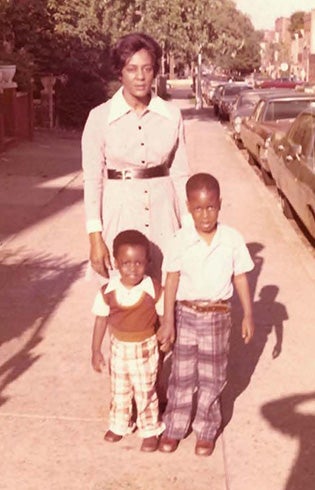
My parents were born in Jamaica, independently moved from their home country to England in pursuit of a better life, and then met in Canada where I was born.
My parents possess very different gifts that complemented each other, and they harnessed these gifts to shape me into who I am today (a scientist, scholar and responsible human being). My parents continue to inspire me every day, and their immigrant story is a testament to what is possible with patience, faith and hard work.
My mother in particular is an incredibly resourceful, savvy and independent person who taught me to persevere and to never give up finding ways to overcome obstacles. She was also unwavering in her dedication to my personal and academic development. My mother was the parent who took me to my first day of school and helped me with my homework in the evening (after a full day of work). She attended every one of my award ceremonies in high school, took me to piano lessons, encouraged my interest in science and proudly accompanied me to my freshman orientation at the University of Toronto.
In addition, she introduced me to the world of computers to enhance my education at a relatively early age, laying the groundwork for my interest in computation, which is the backbone of my research.
My mother has supported me unconditionally my entire life, and she taught me not to be deterred by anti-Black racism but to passionately pursue a life and career that were meaningful to me. Without a doubt, my mother, who infused me with grit and modeled compassion, is a key part of my life’s journey, which has now led me to the West Coast of the United States and to my current position at USC Dornsife.
The love, security, safety and guidance that my mother provided me during my childhood serve as the foundation upon which I build my life, and because of her I am able to offer these qualities to others as an adult.
Everything changed
Peter Kuhn, Dean’s Professor of Biological Sciences and professor of medicine, biomedical engineering, aerospace and mechanical engineering, and urology, explains how his mother’s cancer diagnosis change his life course.
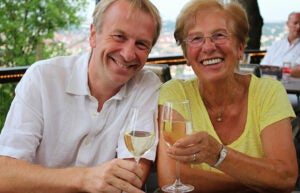
I am the youngest of four children and grew up on a fruit orchard in southern Germany. My mom was always there for us, every day, every morning, every lunch and every dinner. Still to this day, when any one of us is stopping by home, there is a meal on the table seemingly emerging out of nowhere or a piece of cake with a cup of coffee.
I had just turned 17 when my dad sat us all down and explained to us that our mom had been diagnosed with breast cancer. While I had no idea what it really meant, somehow it was clear that everything had changed from one moment to the other. I also had no idea what to do, but it was clear that it now had to be us who had to be there for her, every day.
Very quickly my main job was to bring sunshine into her hospital room (and carefully block dark voices from entering). All the while, my mom enjoyed bossing me around telling me what needed to be done at home. Although my mom recovered, her roommate wasn’t so lucky and relapsed from her cancer early on. During one of our last conversations, the roommate told me, “Keep doing what you are doing in physics, and one day you will help other moms to not suffer from this disease anymore.”
This set me on the journey that eventually brought me to USC and is the very foundation of the USC Michelson Convergent Science Institute in Cancer.
Generations of achievement
Jazlyn Mooney, Gabilan Assistant Professor of Quantitative and Computational Biology, draws inspiration from her mother and grandmother, both ground-breakers in their own right.
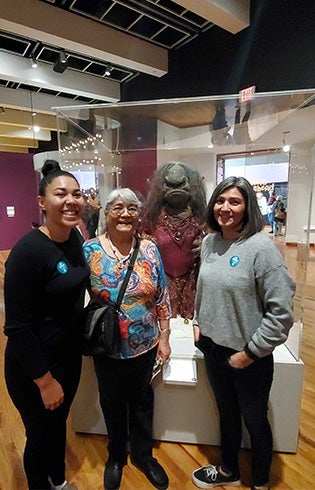
My mother and grandmother have been my best friends my entire life. They have inspired me and my work in too many ways to count.
My mother taught me how to code, which is the foundation of my work as a computational biologist. She was one of maybe 10 women to graduate with a bachelor’s degree in computer science in 1998.
My grandmother received her PhD in administration of higher education shortly before that, in 1997.
My mother became a software engineer and my grandmother remained in academia as a professor at a local community college until she retired. I guess you could say I have turned into both as a new assistant professor in quantitative and computational biology at USC Dornsife.
My mother showed me how much was possible if you know how to code and ask questions. My grandmother’s doctoral thesis was about disparities and barriers in higher education for women of color. Her work motivated me to start a group in graduate school for diverse students to build a community and support each other.
They both inspire me to continue to support my students and make academia a more inclusive space for minoritized people.
Neither ever told me I could not achieve something that I was passionate about, and they have comforted and encouraged me through every high and low.
My favorite memories with my mom and grandmother when I was young were my mom taking me to the pool every day during summer break. Then, we would split a Happy Meal together on the way back to my grandparents’ house. On days when my mom worked, my grandma would take me out to the zoo or the library, or make up stories with me.
Now, the thing I look forward to most when I am home is going on walks with my grandparents and running with my mom.
‘Behind you all the way’
Gayla Margolin, professor of psychology, pays tribute to her mother, who taught her that personal relationships are at the heart of innovation.
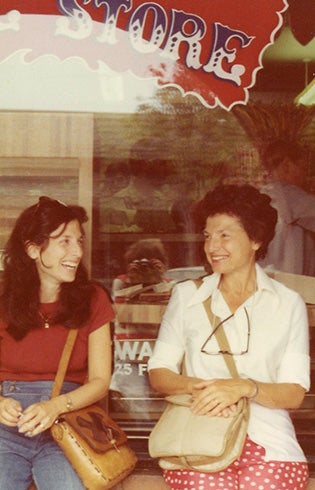
My mom has been my longest and most steadfast fan. “I’m behind you all the way,” she recently whispered. Beyond her unwavering support, my mom gave me two other gifts that contributed to my career.
First was her love of books. As a young child, my mom’s goal was to read every book in her local library — shelf by shelf. It thus was a rude wakening when she realized that the library constantly acquired new books.
Accompanying her each week to the library and carefully selecting an armload of new books was one of my favorite activities as a child. Her enthusiasm for reading clearly spread to me.
Second, my mom epitomized a collaborative spirit. My dad ran his building business out of our home and my mom was always right by his side. She speaks in the language of ‘we’ rather than ‘I’ and she showed me the value of doing things collectively. Perhaps this sparked my scholarly interests in the salutary value of close relationships.
Relatedly, what I have experienced throughout my career is that personal relationships are at the heart of innovative work. The synergy of learning from others — especially from students — when planning and writing up research or doing clinical supervision is the joyful part and the only way to produce meaningful and interesting results.
My mom never wanted to be a teacher like her mother and others in our family — but I am so grateful for her life lessons.
A nontraditional mom
Darby Saxbe, professor of psychology, writes about life growing up with a physician mother who is “the least materialistic person I know.”
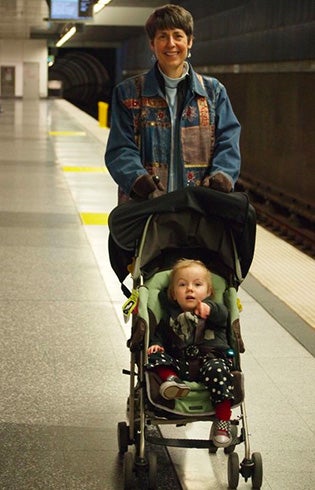
My mom went to Harvard Medical School in the late 1960s as one of very few women in her class, facing overt sexism from faculty and classmates who told her she was taking a spot from a man who needed it. But she genuinely loves medicine, is still working full-time at age 77, and will probably never retire.
Her small-town Ohio practice serves many elderly Medicare patients on fixed incomes, which means she is the worst paid doctor on the planet (an accountant once told her that her practice was an “expensive hobby”), but she is also the least materialistic person I know, so it works out.
When I was a kid, I used to complain that I wanted a traditional mom who’d greet me when I came home from school with a plate of fresh-baked cookies. Of course, the one time she actually met me at the door with cookies, I was totally weirded out. It must have been an April Fool’s joke.
Now, I’m grateful that I got a nontraditional mom who loves her work and exudes intellectual curiosity. She loves to learn languages and toggles between Spanish novels and Latin texts on her Kindle. She reads trashy sci-fi novels and once fixed her Nordic Trak by hand. When the cat dragged in a dead possum a few years ago, she dissected it just for fun. She is always busy and never boring.
In the late ’90s, she diagnosed herself with adult ADHD, which explained a lot. She is a nut, or, to borrow one of her favorite phrases, “a real character.” I can’t really keep up with her, but I admire her more than anyone.